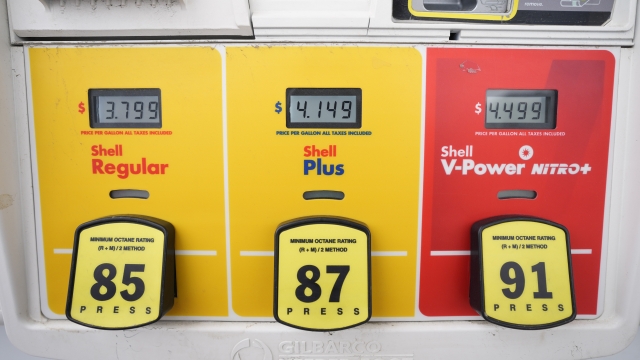The Delek Refinery in Tyler, Texas, produces an average of 75,000 barrels a day. And some of the main factors affecting high gas prices are hot weather and production cuts affecting refineries just like Delek.
"We've seen gas prices increase over the summer ... Crude oil prices started increasing in late June, early July," said Daniel Armbruster, spokesperson for Texas AAA.
Gasoline prices are rising across the country in the middle of peak summer driving season. AAA says the average price for a gallon of regular gas is around $3.82. That's lower than last year's average at this time of around $4, when energy costs soared worldwide in the months following Russia's invasion of Ukraine. But experts say this year's jump is unusual.
"When you look at gas prices, crude oil is the most important factor to look at. And when you break down a gallon of gas, crude is about 50% of the cost of that gallon of gas. So that's why we're seeing gas prices continue to go up across the country, and there's several reasons for that," said Armbruster.
"Typically we see the impact with the heat raising the amount of moisture the atmosphere can hold, causing extended problems with hurricanes and tropical weather," said Ed Hirs, professor of energy and economics at the University of Houston. "We haven't seen that this year, but what we have seen is the heat having an impact on field workers and infrastructure."
SEE MORE: US oil stockpile continues to dwindle, efforts begin to replenish
In the U.S., prices are highly dependent on crude oil. West Texas intermediate crude oil prices have stayed above $80 per barrel since Aug. 3, marking a $12 jump since July.
One of the reasons is this summer's record temperatures. Of the 129 refineries in the U.S., 29 of them operate in Texas, where extreme heat has been a major factor in production, resulting in loss of hundreds of barrels each day.
"We've seen refineries shut down for safety issues — some of them voluntarily, some of them involuntarily. The heat can create power issues which also cause refineries to have to shut down. The good news is it seems that most of those issues have been resolved. Most refineries are coming back online, but it still has an impact and it could for at least a few more weeks," said Armbruster.
SEE MORE: Why are gas prices going up, again?
Beyond the heat, crude supply cuts from major producing countries in the OPEC+ alliance are a huge factor to price increases.
In July, Saudi Arabia started reducing how much oil it sends to the global economy by one million barrels each day.
"The Saudis and OPEC+ have been trying to restrict production for the last 10 months. It finally looks like they actually got to a point where they are dialing back production a little bit and, and that's having a significant impact in price," said Hirs. "The Saudis are very interested in maintaining high oil prices as are the other members of OPEC, everybody across this global economy suffered through the pandemic and the OPEC nations perhaps suffered more than others."
While it's hard to know what gas prices will look like in the coming weeks, experts say the good news is fall should bring relief from the heat. But there is also the risk of refineries powering down because of hurricanes, bringing higher prices.
While prices are out of consumers' hands, there are things we can do ourselves to save on gas. Two major tools AAA recommends are preventing low tire pressure to maximize your fuel efficiency, and downloading apps that show you the cheapest gas prices near you.
Trending stories at Scrippsnews.com




